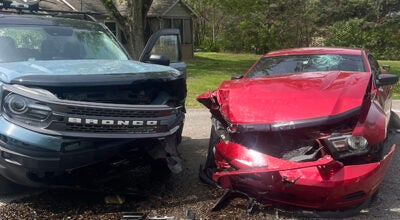Great Start Collaborative
Published 10:58 pm Thursday, January 6, 2011
Cass County Great Start Collaborative Coordinator Heather (McCartney) Merrill graduated from Union High School in 1990. (The Daily News/John Eby)
Starting this spring, a Cass County Great Start Collaborative initiative will bestow community businesses with “family friendly” awards.
“We’re in the process of scheduling a business roundtable summit” for March in collaboration with Midwest Energy Cooperative, Great Start Collaborative Coordinator Heather Merrill told Dowagiac Rotary Club Thursday noon at Elks Lodge 889.
“We’ll be hosting a keynote speaker from Upjohn on what it looks like to revitalize a community through early childhood development,” Merrill said.
After graduating from DUHS in 1990, she studied psychology and sociology in college with an understudy in child development.
She landed her first job with Berrien County Mental Health.
“I was a caseworker for about 25 troubled youth, then moved on to run an independent living program with the graduated troubled youth.”
At that point, Heather decided to start her family with husband Bill, who graduated from DUHS in 1988.
“That’s when my real child development began, raising my children,” she said. “I was home for 10 years. During that time we had an opportunity to live internationally,” doing mission work in Mexico with orphanages for four years.
The Merrills returned to Cass County two years ago.
“We became foster parents,” Heather said. “Two lovely little girls. Now we are a family of seven. We’ve finalized one of the two adoptions. We’re hopeful this year will bring us another finalized adoption. I re-entered the work world about a year and a half ago.”
As coordinator of the Cass County Great Start Collaborative, based at Lewis Cass Intermediate School District (LCISD) on Dailey Road near Cassopolis, Merrill “looks at the dynamics of a community I really care about, having grown up here and been a part of the educational system. It’s something I can get passionate about.
“The initiative itself is a little bit of an enigma. It’s very interesting when people hear I work for early childhood at the intermediate school district, they think preschool. While that’s extremely important, what it was set up to do by the governor (Jennifer Granholm) back in 2006, was to take a look at what the highest success was a community could have on many levels.
“One of the things they determined,” Merrill said, “was having children ready for school. If their school years were successful, then they’d move on to higher education which, in turn, would offer a lot to our communities — investment in economic development and a great return on what family life looks like.
“The governor charged the Early Childhood Investment Corp. at the state with handling putting someone in each county to start this initiative and collaborating to really get children ready to be successful in their school years.”
A key ingredient to the approach was “not ‘coming down’ from the state,” but bubbling up from the grassroots level” with people like Heather, who are “familiar with the county and had lived in the county and experienced things. Then we’d look at creating a collaborative and getting everybody who works in organizations serving young children, such as education, taking a look at the data. Our county has a demographic which shows our strengths and our weaknesses. If we were really going to focus on getting kids ready for school, number one, we had to determine why we want them ready for school. Simply, the data shows that if they’re not ready when they start kindergarten, they generally have a hard time keeping up. We need to start early.”
Merrill said the state determined “that it wasn’t just about early education, but overall health,” of which her family offers a prime example.
“I have three biological children with educated parents and a mom who has worked in and been educated in child development,” she said, “so I knew as a stay-at-home mom what I needed to be doing and what they needed to be exposed to.”
The foster daughters, 9 and 4 months old, lagged the level playing field that support system provided her other children.
“The state’s saying we need to fill these gaps,” Merrill said. “We need to provide services that are not just a handout, but a hand up for families in our community to make it look different here. If we started young in providing those things, while it might be later, the results would be far greater.”
Her 9-year-old, for example, initially required 14 dental visits in six months to address two root canals, six fillings and four extractions.
“Could she be successful in school sitting in a classroom preoccupied and hurting?”
“A lot of what we’ve worked out over the last year and a half as a collaborative group,” Merrill said, “is what services are available within our county to help struggling families? What services are working well? Are our schools working well together? Is our Department of Human Services working with Woodlands mental health? What could we be doing better? It’s important as we create this board that everybody be at the table. Cass County was found to be highly collaborative. People are willing to come to the table because they want to make a difference. They want to know what it is that we can do better collaboratively. How we can get our referral system in better shape? If you work and live in the health care world, sometimes you don’t know all that’s available in the education world.
“How can we create a system for early childhood in which we will see greater success when they walk in the door? How can we look at some of our state-funded programs that have been cut, cut, cut and come up with a new, creative way to sustain them? How is it that at a time when I think people recognize more than ever that the future of our state lies within our youth — we all know we’re all gonna grow — that we can better sustain and advocate for programs necessary for them?”
Great Start devoted the first 18 months to that dialogue across agencies creating a strategic plan of what the next three years might look like in partnerships.
The collaborative board distilled voluminous demographic data into a colorful eight-page report reflecting priority themes, “The Stories of Young Children in Cass County.”
Merrill attended 25 to 30 focus groups to reflect the opinions of citizens along with raw numbers.
“I tried to have a wide range of conversations about what’s important to families in the community at large,” Merrill stated. “You can identify statistics, but you’ve got to know what people want. We needed to know what to work on.”
“That’s how I get to the business end of things,” she said. “The business community often hears ‘early childhood education’ and you’re not entirely sure how those things merge together.
“As business owners and employers in the community, I don’t need to tell you what you’re looking for in employees, but we’ve identified a lack of licensed child care in our county and not one center in Cassopolis. What are the challenges for employees in not having accessible child care? What’s at stake if they don’t have it? Parents want quality when children are spending most of their waking hours there. Sixty percent of our kids are in unlicensed care, which doesn’t always mean bad care, like if my mom watches my kids. However, if the business community’s employees have hurdles to getting good care, what happens if they can’t come to work? Their alternatives within our county are very limited. Everybody matters in revitalization and change.”
As another example, Great Start promotes shopping locally not only to support the business community, but sales tax being the primary funding source for the Michigan school aid fund.
“Every time we cross the border to shop in Indiana,” a flier states, “we’re taking money away from our children’s education.”
“We want to educate our families because we’re a border county,” Merrill explained. “We want them to know they’re part of the answer when schools are in (financial) trouble.”
Asked about her program’s relationship with Tri-County Head Start, Merrill said its director chairs her board.
“We work very closely. Head Start is federally funded for care and resources to children who qualify. They serve a lot of 3- and 4-year-olds in our county.”
But “if you qualify for Head Start, you automatically do not qualify for your state-funded preschool,” which in Dowagiac operates from Justus Gage Elementary School.






